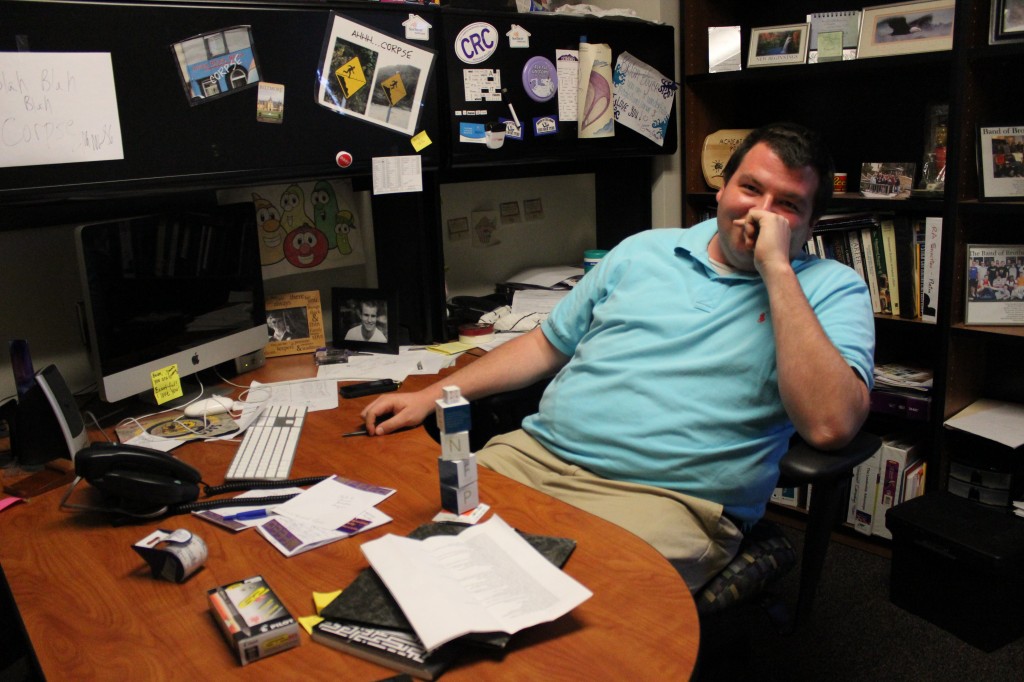Nick Childs
Story originally published in The Western Carolinian
If you have spent any period at Western, you might have heard the name Brian Boyer tossed around on campus.

Boyer is the Residential Case Manager. His job is to connect to the students and be there to help foster student success. His position was created solely to advocate for students, however that may look. This is a job Boyer takes seriously and enjoys.
Outside of the class, Boyer gives back to the local community by staffing the Community Table on Fridays. He also enjoys audiobooks and being on the water. He is a white-water rafting guide for Base Camp Cullowhee. He is a NASCAR and sports fan, and his goal is to visit all NASCAR tracks.
This leads to a friendly and fun soul who wants to help WCU students achieve success.
Boyer felt the universe tugging him to Western after he interviewed – his first interview. He just described it as a “right vibe.” He worked as an area coordinator for eight years, but the Residential Case Manager position was created solely to advocate for students and give busy residential staff better ways to connect with students.
Boyer’s priority is connecting students with available resources and helping students have the best experience at Western. He wants students to know that he is a resource. He wants to remain visible and easy to reach. This is why you may see him eating on campus, attending events, or walking around. You might even have him on social media, a more instant means of reaching him.
He uses his social media to correspond with students and relay information. He communicates with students in a number of ways.
To foster student success, he wants to help direct students to the best help possible. He may not be the best person to help, depending on the situation, but he wants to connect students to the best resources and help they may need. He will call up offices and ask questions to ensure that he’s directing students to the right place.
To best look out for students, he needs to listen to their concerns and observe what may be in the way of their experience.
“Ultimately, we want students to feel like they matter, and they’re seen, and I think that’s what it’s all about, making sure we are aligning our resources and opportunities for them so they can feel seen and feel like they matter,” he said.
Boyer wants students to stay here and enjoy their time, but he understands that not all people will have the same perception of Western. Some may enjoy their Western experience, others may not.
He explained that the factor(s) may contribute to one person’s positive experience may contribute to another’s negative experience.
If you have complaints, you can visit complaints.wcu.edu, which is under the Dean of Students, BaShaun Smith. Boyer frequently collaborates with the dean of students. Certain departments, like dining, hold meets, usually monthly, to address student concerns or feedback, and many also have survey codes. For instance, dining feedback can be given through the QR codes on napkin dispensers or through https://westerncarolina.campusdish.com/ContactUs.
Boyer explained there are many factors to a student’s experience at Western, or any other college for that matter. Academics, activities, services offered, facilities, price of attendance, and so much more contribute to a positive or negative college experience. Boyer has broken it down into three overlapping parts – living, classroom, and social experiences.
Boyer shows up with Catamount spirit around campus, gives back to the community, and engages in Western’s culture. He encourages students to do the same.
The Western Carolinian has written about available resources and encourages students to engage with and use them. They could certainly help with your experience at Western, and they’re usually cheap or free.
“Just find something that you can engage in and… you can spend some time outside the classroom being involved in [it],” Boyer said. While we are students first and foremost, attending classes and doing the work is the most important to student success, it is also important to have outlets away from school.
To succeed, Boyer encourages students to go to class, consider resources, get involved, and try to be as independent as possible. While it is good to remain in touch with your support system, ultimately you are in charge. You are steering your own ship. Take accountability and ownership and do what is best for you.
The same is true for students’ mental health, which Boyer looks at as preventative maintenance, similar to a car. You take all these little steps to take care of issues before they combine and overwhelm you. As The Western Carolinian has encouraged throughout the year, take care of yourself.
The Western Carolinian and The Western Carolina Journalist would like to thank Boyer for the work he does engaging and helping the student body.



